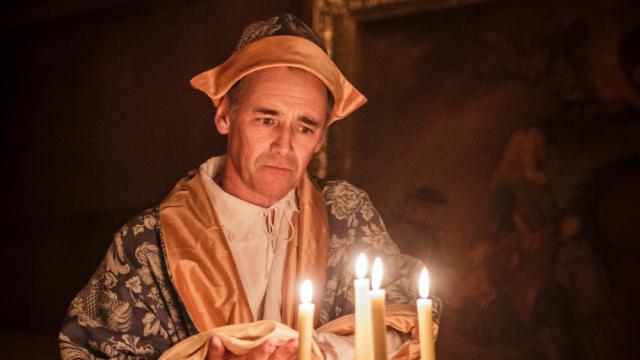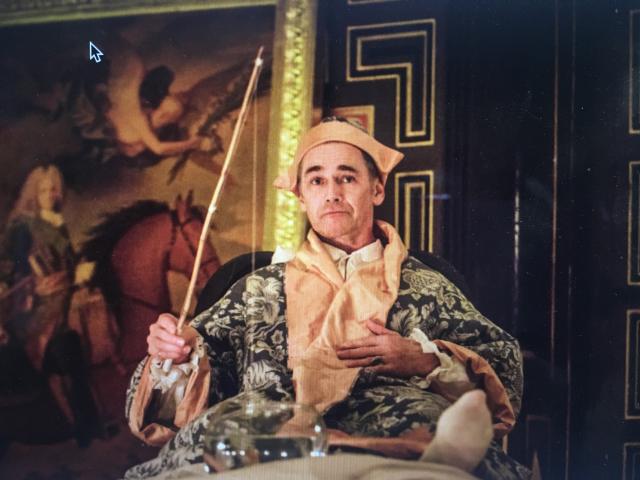

With Farinelli and the King, British actor Mark Rylance has a play he can sink his teeth into, and who better to draw out a play's juicy nuances? An Academy Award and three-time Tony winner, Rylance brings this engaging holiday gift to Broadway after a dazzling 2015 run at Shakespeare’s Globe in London. With her first play, composer Claire van Kampen presents an amplified version of the life of King Philippe V of Spain (1683-1746), keeping intact the essence with certified details but adding her individual byroad of eccentricity. Truth and fiction dance around each other, but van Kampen emerges with a stage-worthy tale that is tailor-made for her real-life husband, Mark Rylance. Rylance paints a portrait of Philippe, a monarch who reigned for almost 50 years, enduring quixotic mental disorders that today might be diagnosed as bi-polar. This, however, is the early 18th century so Philippe is viewed by the court with suspicion, unable to rule and ripe for dethroning. Even the Queen, his second wife, Isabella Farnese (Melody Grove) is worried as Philippe's moods swing wildly. Before dawn one morning, he is lying in bed, fishing in his goldfish bowl and murmuring, "How much happier you are than I!" The next moment he is raging through the palace and physically attacking the Queen. The court, led by chief counselor Don Sebastian De La Cuadra, played authoritatively by Edward Peel, is ready to overthrow Philippe but supportive, long-suffering Isabella has one last hope — music. The palace physician has told her of the restorative powers of music, particularly as sung by the renown edItalian operatic castrato, Farinelli. She arranges to bring Farinelli (born Carlo Broschi) from his opera engagement in London to sing for the King in the celestial, gender-neutral manner called "castrato." How she manages to convince Farinelli to leave his adoring fans and go to Spain is not spelled out here. Isabella is right, however, about Farinelli's music. Philippe is drawn to the music and gradually to Farinelli himself, finding their troubled lives are strangely similar. Philippe tells the singer, "We were both made kings against our will." The King is descended through French royalty, and the singer became "Farinelli" after his castration at age ten. He is portrayed in dual casting by Sam Crane while in his shadow, countertenor Iestyn Davies exquisitely sings the emotional music, mostly arias by Handel, including the transcendent “Cara sposa” from Rinaldo. Director John Dove keeps the focus of the play on Philippe. Rylance delivers a portrait of the troubled monarch embodying all his volatile mood changes, "...around we go; pain, joy, ecstasy, despair." In the second act, Philippe articulates the miracle of Farinelli's music: "Now I feel, I hear, I see. And do you know, how this elusive memory of mine came back to me? Sleeping in this garden I dreamed an angel was singing to me, and this was you, Farinelli." As Isabella, Grove hints at political shrewdness and shows savvy in her support of Philippe. But the character of the Queen is left unsubstantial and becomes one of the gaps in van Kampen’s play. Not included as character or plot motivations are the violent upheavals in Europe or any mention of Philippe's son. Director Dove presents an ornate and undeniably sentimental transplant from London to the gorgeously restored Belasco Theater. With Jonathan Fensom's set design, hanging candelabras, and lighted candles, Paul Russell's lighting provides a burnished glow that enhances the rich music arranged by van Kempen. Onstage are two tiers of audience seating and in a raised onstage tier, musicians play period instruments and occasionally wander among the performers. At one stunning point in Farinelli's aria, the singer suddenly soars into the stars. Although the play lacks depth, it is a visual tour de force and scores with Mark Rylance's performance and Farinelli's glorious arias. Theatergoers can't help but acknowledge the curative power of music.
Philippe's mental health improves markedly when the action moves from the palace to the country where Farinelli performs for the King and his audience in the forest and under the stars.
